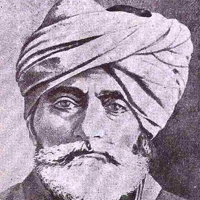Muhammad
Husain Azad (1830-1910) was a prominent Urdu writer, historian, and scholar
from India. He is known for his works on Indian history, language, and
literature. Azad was born in Delhi and received his education in Persian and
Arabic. He later learned Urdu and English and became a proficient writer in
both languages.
Azad's
most famous work is "Aab-e-Hayat," which is a history of the Delhi
Sultanate. He also wrote "Darbar-e-Akbari," a biography of Mughal
emperor Akbar, and "Tazkirah-e-Akbari," a historical account of
Akbar's reign. Azad was also a member of the Indian National Congress and
played an active role in the Indian independence movement.
In
addition to his historical works, Azad also wrote poetry and literary
criticism. He was known for his progressive views and support of modernization
in India. Azad's contributions to Urdu literature and Indian history have had a
lasting impact and continue to be studied and appreciated today.
Here is an English translation of one of Muhammad
Husain Azad's famous Shayari:
"Every particle of dust speaks of the glory of
the Lord,
Every atom tells the story of the universe.
Whoever has been blessed with eyesight,
Can witness the beauty of creation all around."
in Urdu
"Har zarra-e-khak, Allah ki shaan keh raha hai,
Har dhairya-e-atam, duniya ki daastan keh raha hai.
Jise de di ho basar nazar ki khushiyan,
Wo tamasha-e-kainat ko dekh kar khush ho jaye."
Every particle of dust speaks of
the glory of the Lord,
Every atom tells the story of the universe.
Whoever has been blessed with eyesight,
Can witness the beauty of creation all around."
"Har ek baat pe kehte ho tum ke 'too kya hai?'
Tumheen kaho ke yeh andaaz-e-guftgoo kya hai?
"You ask me 'What are you?' at every
turn
Tell me, what kind of way of talking is this?"
ہر ایک بات پہ کہتے ہو تم کہ
'تو کیا ہے؟
تمہیں کہو کہ یہ اندازِ گفتگو کیا ہے؟
Har ek baat pe kehte ho tum ke 'too kya hai?'
Tumheen kaho ke yeh andaaz-e-guftgoo kya hai?
"You ask me 'What are you?' at every turn
Tell me, what kind of way of talking is this?"
"हर एक बात पर कहते हो तुम कि 'तू क्या है?'
तुम्हें कहो कि यह अंदाज़-ए-गुफ़्तगू क्या है?"
"Khoob parda hai ke chilman se lage baithe ho,
Tumhare husn ki taareef karte karte."
"It's good that you sit behind the
curtains,
As I go on praising your beauty."
This shayari reflects the cultural and societal norms
of Azad's time in India, where it was considered inappropriate for men and
women to openly express their affection or admiration for each other.









No comments:
Post a Comment